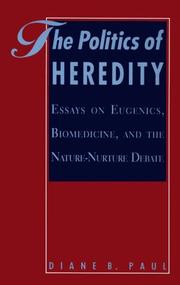| Listing 1 - 10 of 17 | << page >> |
Sort by
|
Book
ISBN: 3854491093 9783854491095 Year: 1997 Publisher: Wien Sonderzahl
Abstract | Keywords | Export | Availability | Bookmark
 Loading...
Loading...Choose an application
- Reference Manager
- EndNote
- RefWorks (Direct export to RefWorks)
Sociology of minorities --- anno 1900-1999 --- Racism --- Racism - Europe --- RACISME --- EUGENISME --- IMMIGRES --- INTEGRATION --- EUROPE

ISBN: 213046789X 9782130467892 Year: 1995 Volume: *5 Publisher: Paris PUF
Abstract | Keywords | Export | Availability | Bookmark
 Loading...
Loading...Choose an application
- Reference Manager
- EndNote
- RefWorks (Direct export to RefWorks)
Eugenetica --- Eugenics --- Eugénisme --- Homiculture --- Race improvement --- Heredity, Human --- Race discrimination --- Genetic engineering --- Hérédité humaine --- Discrimination raciale --- Génie génétique --- History --- Histoire --- eugenetica (eugenese, eugenetiek) --- eugénisme (eugénique) --- Eugénisme --- Hérédité humaine --- Génie génétique --- United States --- Great Britain

ISBN: 9780674019270 067401927X 9780674036383 0674036387 0674043065 Year: 2007 Publisher: Cambridge, Mass. Belknap Press
Abstract | Keywords | Export | Availability | Bookmark
 Loading...
Loading...Choose an application
- Reference Manager
- EndNote
- RefWorks (Direct export to RefWorks)
Breakthroughs in genetics present us with a promise and a predicament. Although most people find at least some forms of genetic engineering disquieting, it is not easy to articulate why. This work explores these and other moral quandaries connected with the quest to perfect ourselves and our children.
Ethics of family. Ethics of sexuality --- Genetic engineering --- eugenetica (eugenese, eugenetiek) --- genetische engineering (manipulatie) --- verbetergeneeskunde (mensverbetering) --- Moral and ethical aspects. --- eugénisme (eugénique) --- génie génétique (ingénierie génétique) --- médecine de l'amélioration (médecine d'amélioration) --- Moral and ethical aspects --- Human genetics
Book
ISBN: 9780262046220 0262367262 9780262367264 0262046229 Year: 2021 Publisher: Cambridge, Mass. The MIT Press
Abstract | Keywords | Export | Availability | Bookmark
 Loading...
Loading...Choose an application
- Reference Manager
- EndNote
- RefWorks (Direct export to RefWorks)
In Discriminating Data, Wendy Hui Kyong Chun reveals how polarization is a goal—not an error—within big data and machine learning. These methods, she argues, encode segregation, eugenics, and identity politics through their default assumptions and conditions. Correlation, which grounds big data’s predictive potential, stems from twentieth-century eugenic attempts to “breed” a better future. Recommender systems foster angry clusters of sameness through homophily. Users are “trained” to become authentically predictable via a politics and technology of recognition. Machine learning and data analytics thus seek to disrupt the future by making disruption impossible. Chun, who has a background in systems design engineering as well as media studies and cultural theory, explains that although machine learning algorithms may not officially include race as a category, they embed whiteness as a default. Facial recognition technology, for example, relies on the faces of Hollywood celebrities and university undergraduates—groups not famous for their diversity. Homophily emerged as a concept to describe white U.S. resident attitudes to living in biracial yet segregated public housing. Predictive policing technology deploys models trained on studies of predominantly underserved neighborhoods. Trained on selected and often discriminatory or dirty data, these algorithms are only validated if they mirror this data. How can we release ourselves from the vice-like grip of discriminatory data? Chun calls for alternative algorithms, defaults, and interdisciplinary coalitions in order to desegregate networks and foster a more democratic big data.
Big data --- Artificial intelligence --- Privacy, Right of. --- Social aspects. --- General ethics --- Human rights --- Artificial intelligence. Robotics. Simulation. Graphics --- Données massives --- Apprentissage automatique --- Ségrégation. --- Eugénisme --- Identité collective --- Aspect politique. --- Big data - Social aspects --- Artificial intelligence - Social aspects --- Privacy, Right of
Book
ISBN: 2130419178 9782130419174 Year: 1988 Volume: 2422 Publisher: Paris PUF
Abstract | Keywords | Export | Availability | Bookmark
 Loading...
Loading...Choose an application
- Reference Manager
- EndNote
- RefWorks (Direct export to RefWorks)
Medical ethics --- Eugenics --- Ethique médicale --- Eugénisme --- Nuremberg Medical Trial, 1946-1947 --- Eugénisme --- Medical bioethics --- Medical bioethics. --- Nuremberg Medical Trial, Nuremberg, Germany, 1946-1947. --- misdaad tegen de menselijkheid --- crime contre l'humanité --- Professional ethics. Deontology --- Human medicine --- 614.22 --- Désherbage --- Deselectie --- bio-ethiek (medische, biomedische ethiek, bio-ethische aspecten) --- experiment, experimenteel onderzoek (mensen) --- eugenetica (eugenese, eugenetiek) --- Medische ethiek --- bioéthique (éthique médicale, biomédicale, aspects bioéthiques) --- expérimentation sur la personne humaine (chez l'humain) --- eugénisme (eugénique) --- Ethique médicale --- Ethics, medical
Book
ISBN: 9789004276260 9789004276277 9004276270 9004276262 Year: 2015 Volume: 93 Publisher: Leiden
Abstract | Keywords | Export | Availability | Bookmark
 Loading...
Loading...Choose an application
- Reference Manager
- EndNote
- RefWorks (Direct export to RefWorks)
"In Degeneration and Revolution : Radical Cultural Politics and the Body in Weimar Germany Robert Heynen explores the impact of conceptions of degeneration, exemplified by eugenics and social hygiene, on the social, cultural, and political history of the left in Germany, 1914-33. Hygienic practices of bodily regulation were integral to the extension of modern capitalist social relations, and profoundly shaped Weimar culture. Heynen's innovative interdisciplinary approach draws on Marxist and other critical traditions to examine the politics of degeneration and socialist, communist, and anarchist responses. Drawing on key Weimar theorists and addressing artistic and cultural movements ranging from Dada to worker-produced media, this book challenges us to rethink conventional understandings of left culture and politics, and of Weimar culture more generally"--
Politics and culture --- Degeneration --- Radicalism --- Right and left (Political science) --- Human body --- Eugenics --- Public health --- Politique et culture --- Dégénérescence --- Radicalisme --- Droite et gauche (Science politique) --- Corps humain --- Eugénisme --- Santé publique --- History --- Political aspects --- Histoire --- Aspect politique --- Germany --- Allemagne --- Social conditions --- Politics and government --- Conditions sociales --- Politique et gouvernement --- Dégénérescence --- Eugénisme --- Santé publique

ISBN: 0195077318 Year: 1996 Publisher: Oxford Oxford University Press
Abstract | Keywords | Export | Availability | Bookmark
 Loading...
Loading...Choose an application
- Reference Manager
- EndNote
- RefWorks (Direct export to RefWorks)
Black Stork (Film) --- Black Stork (Motion picture) --- Eugenetica in de film --- Eugenics in motion pictures --- Eugénisme dans le cinéma --- Euthanasia --- Moral and ethical aspects --- Eugenics --- United States --- History --- 20th century --- Newborn infants --- Diseases --- Treatment --- Abnormalities [Human ] --- Infanticide --- Infants (Newborn) - Diseases - Treatment - Moral and ethical aspects. --- Eugenics in motion pictures. --- Abnormalities, Human - Treatment - Moral and ethical aspects. --- Infanticide - Moral and ethical aspects.
Book
ISBN: 2800409479 9782800409474 Year: 1988 Volume: 7 Publisher: Bruxelles : Editions de l'Université Libre de Bruxelles [U.L.B.],
Abstract | Keywords | Export | Availability | Bookmark
 Loading...
Loading...Choose an application
- Reference Manager
- EndNote
- RefWorks (Direct export to RefWorks)
Bioéthique --- Euthanasie --- Fécondation in vitro --- Procréation médicalement assistée --- Droit --- Aspect moral --- Bioethics. --- Ethics, Medical. --- 17.023.33 --- Medical Ethics --- Medicine --- Professionalism --- Bioethics --- Biomedical Ethics --- Health Care Ethics --- Ethics, Biomedical --- Ethics, Health Care --- Ethics, Medical --- Ethicists --- Biologische doeleinden. Bio-ethiek; bioethiek. Übermensch. Medische deontologie --- ethics --- Ethics --- medical --- 17.023.33 Biologische doeleinden. Bio-ethiek; bioethiek. Übermensch. Medische deontologie --- medical. --- Biologie --- Ethique philosophique --- Laïcité --- Vrijzinnigheid --- Wijsgerige ethiek --- Ethique et biologie --- Ethiek / en biologie. --- Euthanasie - Droit --- Euthanasie - Aspect moral --- Fécondation in vitro - Aspect moral --- Procréation médicalement assistée - Droit --- Procréation médicalement assistée - Aspect moral --- Libre pensée --- Éthique médicale --- Eugénisme
Periodical
ISSN: 14697599 00219320 Year: 1969 Publisher: Oxford : Cambridge : [Cambridge, England] : Published for the Galton Foundation by Blackwell Scientific Publications Galton Foundation Cambridge University Press
Abstract | Keywords | Export | Availability | Bookmark
 Loading...
Loading...Choose an application
- Reference Manager
- EndNote
- RefWorks (Direct export to RefWorks)
Eugenics --- Eugenics. --- Internet resources. --- Electronic journals. --- Biological Science Disciplines. --- Genetics, Medical. --- Social Sciences. --- Homiculture --- Race improvement --- Science, Social --- Sciences, Social --- Social Science --- Human Genetics --- Medical Genetics --- Genetics, Human --- Biologic Sciences --- Biological Science --- Science, Biological --- Sciences, Biological --- Biological Sciences --- Life Sciences --- Biologic Science --- Biological Science Discipline --- Discipline, Biological Science --- Disciplines, Biological Science --- Life Science --- Science Discipline, Biological --- Science Disciplines, Biological --- Science, Biologic --- Science, Life --- Sciences, Biologic --- Sciences, Life --- Euthenics --- Heredity --- Involuntary sterilization --- Anthropology, Physical --- Chromosome Disorders --- Sex Chromosome Disorders --- Genetic Diseases, Inborn --- Molecular Medicine --- Social Sciences --- Eugénisme --- Sciences sociales. --- Sciences de la vie. --- Génétique médicale. --- social sciences. --- biological sciences.

ISBN: 0585091358 9780585091358 079143821X 0791438228 1438415621 Year: 1998 Publisher: Albany State University of New York Press
Abstract | Keywords | Export | Availability | Bookmark
 Loading...
Loading...Choose an application
- Reference Manager
- EndNote
- RefWorks (Direct export to RefWorks)
This book explores the development of hybrid corn, the history of eugenics, human genetics, the nature-nurture debate, the origins of the Marxian concept of proletarian science, the shift in the meaning of "fitness" in evolutionary theory, the practice of normal science in Nazi Germany, and the making and selling of science textbooks. While the topics are diverse, a common theme unites them - each explores links between biological science, social power, and public policy.
Eugenics --- Human genetics --- Nature and nurture --- aanleg/opvoeding --- eugenetica (eugenese, eugenetiek) --- #SBIB:316.334.3M51 --- Environment --- Genetics and environment --- Heredity and environment --- Nature --- Nature versus nurture --- Nurture and nature --- Genetics --- Heredity --- Human beings --- Heredity, Human --- Human biology --- Physical anthropology --- Homiculture --- Race improvement --- Euthenics --- Involuntary sterilization --- Political aspects&delete& --- History --- nature/culture (inné/acquis) --- eugénisme (eugénique) --- Organisatie van de gezondheidszorg: modellen van therapeutisch handelen --- Nurture --- Effect of environment on --- Political aspects --- History. --- Environment and genetics --- Environment and heredity --- HEREDITY --- EUGENICS --- NATURE AND NURTURE --- BIOMEDICAL ENGINEERING --- SCIENCE --- TECHNOLOGY & ENGINEERING --- Nature And Nurture --- Biomedical Engineering --- Science --- Technology & Engineering --- Biomedical engineering --- Technology & engineering
| Listing 1 - 10 of 17 | << page >> |
Sort by
|

 Search
Search Feedback
Feedback About UniCat
About UniCat  Help
Help News
News